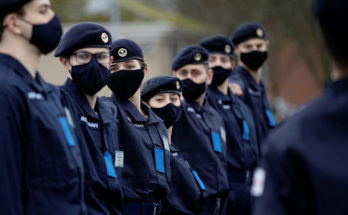
The war in Ukraine is serving as a tutorial for militaries on the provision of medical services during a time of war. Maj. Gen. Timothy Hodgetts CB CBE KHS, Surgeon General – UK Defence Medical Services, spoke at DSEI on September 13 about the future of medical services provided by nations in a struggle for survival. Ukraine, finding itself in this position, has brought to the forefront certain deficiencies and ways to improve NATO members’ treatment of the wounded.
Major General Hodgetts hit on many points, from rail transportation to PPE and medical supplies. His top five talking points laid out issues that militaries should address moving forward.
5. Outcomes will be poorer in large-scale operations.
Many recent conflicts that have involved Western forces have been expeditionary in nature. There have not been struggles of the kind that Ukraine is facing since the Second World War. The main point here is that the goal should be to maintain the same care during a war of national existence that was provided in Iraq and Afghanistan. There is a difference between these two types of conflicts and, although lessons can be learned from both, the larger the conflict, generally the poorer the medical care. The focus moving forward will be on expediting the wounded to hospital care. Training is currently being provided to Ukraine in this respect.
4. Civil and military cooperation is essential.
Wars on the scale of the Russo-Ukrainian war will demand cooperation between military and civilian medical services. Whereas formerly the military provided the bulk of medical care to soldiers, now civilian hospitals and services will need to be brought into the fold. In wars of this nature, military facilities will quickly be overwhelmed and civilian help will be needed.
3. National recovery demands an integrated national plan.
The transition from war to peace will be one that needs a plan. International efforts by allies are needed to ensure that civilian life can return unfettered.
2. Expect the enemy will not adhere to IHL and LOAC standards.
The war in Ukraine has demonstrated that international agreements are regularly broken, with Russia in particular known for targeting hospitals. In order for soldiers to maintain the will to fight, it is paramount that they know that if they get wounded, they will be cared for. What does this mean? It means that hospitals must be decentralized, much like military headquarters. There is little sense in giving the enemy a large target. Moving underground is an option.
1. Military medicine advances in war tend to reverse in peace.
Readiness for war is an important aspect of combat medicine. Losing technological ground in times of peace is not the way forward. Readiness and investment in military hospitals will be necessary to maintain wartime advances.
Many lessons have been learned in Ukraine and likely will continue to be. Medicine might not be as flashy as F-16s but is necessary to wage war. Ukraine has shown the world that heavy combat and wars of national existence might be here to stay. Being prepared in all aspects of war will ensure victory.
Carter Palmer has long held a keen interest in military matters and aviation. As an analyst for Industrial & Marine Turbine Forecast, Carter specializes in examining key gas turbine programs for electrical power generation, mechanical drive, and marine propulsion applications. He is also responsible for updating the reports and analyses within the Space Systems Forecast – Launch Vehicles & Manned Platforms and Space Systems Forecast – Satellites & Spacecraft products.




